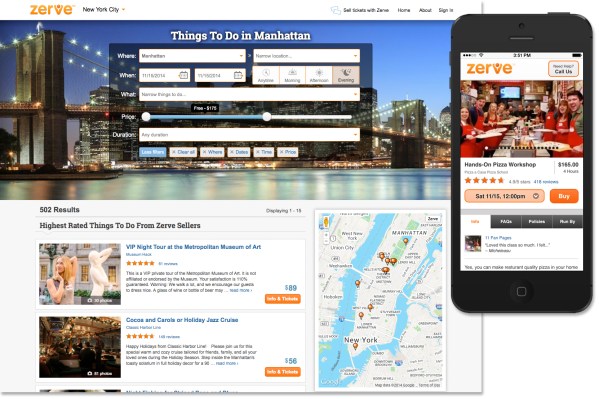Zerve, a startup backed by the likes of DFJ and Yahoo founder Jerry Yang that has built a merchant platform for local businesses to list activities, and then take sign-ups and payments for them — think OpenTable for events — is today kicking off a new phase in its life. It’s opening up for business as a direct-to-consumer portal, taking what was once a back-end platform that powered listings and sales for other businesses and making it open to all.
The move comes as Zerve gears up also to launch its first partnerships with larger platforms that have also been eyeing up the activity space but have yet to build any services like these of their own.
Based in New York, Zerve has actually been around since 2003, and in that time has passed some significant milestones. It currently has a database of some 30,000 activities across 32 U.S. metropolitan areas; it has already connected “millions” of people with things to do; and, in the words of Scott Newman, Zerve’s founder and exec chairman, it claims to have “far more consumer reviews of the SMB’s we cover than Yelp, TripAdvisor and Google combined.”
And, after several initial years of bootstrapping, Zerve has also quietly picked up some interesting financial backing along the way — specifically $20 million led by DFJ but also counting New Atlantic Ventures, Yang and a number of other prominent angels among its investors. Newman says that it’s now raising “another significant round.”
“Since founding in 2003, Zerve has been quietly going about executing our B2B business, leading to 12 straight years of growth,” he says. And in that time there has been a lot of growth internally: the merchant platform includes cloud-based business management software, consumer-facing online and mobile tools like ticketing, calendar, reviews, photos, for merchants to grow their business, and so on.
Zerve taps into the same swathe of local and independent merchants that companies like Groupon are also targeting (in particular with its own events business, which beefed up in 2013 with the addition of SideTour). Newman says that this spans from people who run “high-end sushi tastings” through to fishermen who run tuna catching trips, and those who organise walking tours of Harlem and the Bronx with hip-hop pioneers and nightlife events. “These are some seriously inspiring people and our job is to help them be more successful at whatever they’ve dreamed up,” he says.
That merchant platform he says has a 90-98% retention rate — meaning the vast majority of customers become repeat users. That, plus the volume of consumer reviews, are two metrics that should make companies like Yelp, Groupon, LivingSocial and more specific events companies like Vayable and Eventbrite site up and take notice.
(And, because he didn’t think I’d believe his claim on the reviews, he suggested Googling “classic harbor line nyc“. Yelp yielded 96 reviews; TripAdvisor had 631 reviews; and Google had 9 reviews. Zerve listed 9,477 reviews.)
So why the move now to expand the platform?
Consumer demand, he says, from people who have found an event through a particular vendor and now want to find more.
“In the process of providing Zerve‘s service to our merchant clients this past decade-plus, we have helped millions of consumers book and attend events, both online and over the phone,” he says. “So as part of doing that job, the one question they kept asking us over and over again was, ‘But can’t you help me find more of these in the first place? I love to do this kind of stuff, I know there must be tons of really cool things going on all around me all the time, but I have no idea how to find them.'”
The idea of expanding to serve consumers directly also speaks to Zerve’s ambitions to scale its business. The company only makes money when people actually buy tickets to events, meaning that this is a volume game that is focused largely on economies of scale. Also, more traffic will make Zerve potentially a lot more attractive to would be partners as well as merchants to grab more listings and potential business.
To me it seems like companies like Groupon, Vayable and Eventbrite might be the most obvious competitors to Zerve, especially as it expands into a more direct-to-consumer portal. Newman thinks otherwise.
“Honestly the biggest competitor to Zerve on the consumer side of things is ‘dinner and a movie’, … or on the tourism side of things, it would be the Statue of Liberty in NYC or Empire State Building in NYC. The problem of ‘What do you want to do today/tonight/next week?’ has just not been solved at all yet by technology,” he says.
“It’s a problem we all face at least multiple times per week, for some people every day, and in spite of the web having been around for 20+ years now, people have not yet found a product that really helps them solve this, so they just do the same things they’ve always done because they don’t know what else is out there.”
While companies like Yelp and Google have yet to add time-based activity searches on to their platforms, others like like Yplan are also trying to tackle this problem, albeit less on a wider aggregation front and more on giving users far less ability to make choices, instead serving them going-out options of a couple of select events taking place on that very day.
